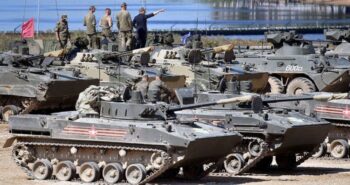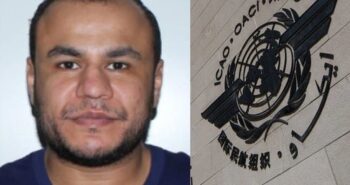Early Elections Would Be a Disaster
By Frederic Wehrey and Wolfram Lacher
To visit Libya in recent months is to encounter a country holding its breath, caught in the throes of abeyance and a deep foreboding.
It is a lawless place, riddled with criminality and flare-ups of fierce fighting in the south and east.
Oil revenues have fallen due to recent factional clashes and elite plunder has everyday Libyans struggling for subsistence amid deep economic crisis.
Overlaying all of this is a lingering political stalemate. Formal authority is split between a feeble, internationally recognized Government of National Accord (GNA) in the capital of Tripoli and eastern institutions dominated by Field Marshal Khalifa Hiftar, who once served under the former Libyan leader Muammar al-Qaddafi but later had a falling-out.
But much of the country’s west and south escapes the control of these rival authorities.
There has been no shortage of Western proposals to break the gridlock and stave off further collapse, the most popular of which include early elections, as French President Emmanuel Macron recently advocated for in a meeting with Libyan leaders in Paris.
Proponents of this approach argue that only elections can produce a new government with the popular backing needed to overcome the legal limbo affecting all of Libya’s competing legislative and executive bodies. It is a wiping of the slate, these advocates say, a chance to sideline spoilers on both sides and replace the long-suffering GNA with a more viable body.
Yet for all of these seductions, in reality, swift elections may lead to greater disorder. Without a firm constitutional basis, voting would produce a government whose legitimacy is contested even more widely. The absence of a constitution also leaves open the executive authority of the president—a particular concern for opponents of Hiftar, who see in his support for elections a thinly veiled ploy to become ruler for life. This by itself could be a major flash point.
In the Hiftar-controlled east, free elections are impossible. But even outside it, in the best case, voting results would be heavily influenced by local strongmen and militias, and polling threatens to ignite violent local conflicts.
THE SOURCES OF STALEMATE
In many respects, the paralysis in Libya stems from the flawed Libyan Political Agreement (LPA), the UN-brokered deal signed in Skhirat, Morocco, in December 2015. That agreement, aimed at ending the fighting between Libya’s so-called Dawn and Dignity factions, produced the Government of National Accord in Tripoli but was unable to unify Libya’s fragmented political, economic, and military bodies.
The conception and execution of dialogue in the lead-up to the deal was rushed at the behest of outside powers and, more important, it was artificially structured as a deal between two parties when in fact the conflict’s actors were more numerous and diverse.
By relying on signatories from the two parliaments (one in the east and one in the west of the country) who did not speak for the actual forces on the ground, it set the stage for continued gridlock.
A crucial sticking point was the authority of the commander in chief of the armed forces, which the agreement gave to the GNA’s Presidency Council—a stipulation rejected by Hiftar and his supporters.
To surmount this gridlock, the new UN envoy in Libya, Ghassan Salamé, proposed an “action plan” consisting of amendments to the LPA (to include a reconstituted Presidency Council), a national conference, a popular referendum on the constitution, and the preparation of presidential and parliamentary elections with appropriate voting laws.
Unfortunately, the plan has been stuck on nearly every count: there is no movement on revising the makeup of the council; progress on the national conference, which the UN outsourced to a nongovernmental organization, has been slow and fitful; and the eastern House of Representatives (HoR) won’t put the constitutional referendum law to a vote. That leaves elections as the last remaining pillar.
Salamé long argued that elections could take place only once the conditions were ripe. Now, although no headway has been made, elections are to be held regardless, in December 2018, according to Macron’s initiative.
Progress has been stymied by entrenched spoilers and structural factors. Too many elite actors are benefiting from the status quo; members of both the HoR and the High Council of State seem more interested in clinging to power than in moving the country forward.
In Tripoli, the GNA has fallen prey to a cartel of militias who are stuffing the administration with their allies to plunder state budgets and assets. Beyond these failures in elite will and vision, political shifts on the ground have obstructed progress. Power has become more fragmented and diffuse, and new coalitions of interest groups are forming, often between former antagonists.
The parties to a potential settlement are becoming increasingly splintered and unable to reach a consensus. In the east, multiple divisions have surfaced, with many who had backed Hiftar during his three-plus-year campaign in Benghazi growing resentful of his concentration of authority in the hands of his sons and relatives.
In the west, the port city of Misrata has seen its clout wane in the capital as local Tripoli militias have consolidated power—it was this deprivation that spurred Misrata to make peace with its rival city of Zintan, another power center with longtime interests in the capital.
Disparate international approaches to Libya, driven by self-serving agendas, have worsened the divides, creating incentives for various factions not to come to the table. Despite agreeing to the UN-backed accord in principle, Egypt and the United Arab Emirates never stopped backing Hiftar but actually increased their support. Joining them were Russia and France.
Libyans widely perceive Paris as biased toward the field marshal. Among other Europeans, the Italians have cut deals with western militias to counter the flow of migrants to their shores.
Outside powers have also been active as arbiters and would-be mediators through various summits and forums. Most of these initiatives can hardly be considered neutral, and even the most well-meaning of them have had the effect of muddying the thrust of the UN-led effort.
The latest example of this is Macron’s May 29 meeting in Paris.
Hailed as a triumph by the French government, the meeting in the Élysée Palace was convened by the French president between four leading figures—Hiftar; Faiz Serraj, the prime minister of the Tripoli government; and the heads of two rival legislative bodies, the eastern-based House of Representatives and the High Council of State from Tripoli. It produced a Libyan pledge to hold presidential and parliamentary elections by the end of the year, along with commitments to unify the country’s splintered financial and security institutions.
But the French initiative is problematic. It was a hastily cobbled-together, unilateral effort. Other Western governments with a stake in Libya—most notably Italy’s—were taken aback by the French president’s high-handed manner and are already pushing back against the plan. Three of the four Libyan figures whom Macron paraded as power brokers can be described only as figureheads without real influence.
The summit failed to include other key Libyan veto players—such as the Misratans, who refused to send a delegation after being denied the same status as the four figures. And even these four representatives did not, in fact, agree on anything in Paris. They did not sign Macron’s declaration and left unsolved the question of the constitutional basis for elections. According to attendees, Macron presented the December 10 election date to the press before any of the four could object.
Moreover, the Macron plan rests on the faulty notion that elections can serve as a panacea for Libya’s disorder. A key obstacle to elections is the absence of a constitutional basis. There is no framework to define what institutions should be elected and what their powers should be. Last summer, a constituent assembly elected in 2014 finally produced a draft constitution, following years of deadlock. But the text is controversial, and a referendum on it would prove extremely divisive.
An alternative proposal is to use a framework drafted under the previous legislature in 2014 as an amendment to the transitional road map then in place, before state institutions split amid civil war. But the contest over that framework actually helped create the crisis of legitimacy now engulfing all of the rival executive and legislative bodies.
Libya’s Supreme Court later ruled that the amendment had never been properly adopted, leading opponents of the eastern-based institutions to argue that the basis for the 2014 elections to the HoR was invalid. Whatever basis for elections is found, it has to enjoy broad-based support—or else the newly elected bodies will face even more serious challenges to their legitimacy. Clearly, an agreement between four widely unpopular figures would not suffice to tackle this problem.
The lack of broadly agreed-upon rules is particularly problematic with regard to the presidential elections envisaged in the Macron plan. In a stalemated conflict between heavily armed factions, presidential elections raise the specter of a winner-takes-all contest that could provoke a major escalation.
The Macron plan notwithstanding, many Western policymakers see parliamentary elections as a less risky enterprise than a presidential vote. But while presidential elections would threaten to provoke a major escalation between two opposing camps, legislative elections risk triggering more widely diffused violence at the local level.
In the 2012 elections, few localities saw electoral violence or intimidation; in 2014, the problem was slightly more widespread. Since then, however, local militias have in many places consolidated into vested interest groups that thrive on smuggling and plunder and have become deeply involved in politics.
During the stalemate of the past years, they have seen how lucrative positions as spoilers in elected institutions can be and are now set to intervene much more forcefully in an electoral process. Most cities in western and southern Libya host multiple armed groups, raising the prospect of violent struggles where such groups compete—rather than coordinate—with one another.
A MORE DURABLE APPROACH
Ultimately, reestablishing a single central authority that enjoys electoral legitimacy is the clear way out of Libya’s turmoil. The question is not what the alternatives to elections are but how the conditions for successful elections can be put in place. The answer lies in a negotiated settlement that provides a detailed road map toward elections. This is not the stuff of flamboyant but fleeting unilateral initiatives. Reaching such a settlement requires international coordination, a careful design of the negotiating process, and stamina.
The idea of yet another transitional arrangement is widely unpopular in Libya, and UN Envoy Salamé has explicitly ruled this option out. But a transition is precisely what is needed to prepare the ground for elections. It would have to include a renegotiated power-sharing arrangement that would extend to economic and security institutions.
This would mean, for example, that unified command structures in Tripoli would gain at least a modicum of oversight over security agencies in eastern Libya and could monitor acts of violence that interfere with the electoral process there.
It would also require new security arrangements in Tripoli to loosen the stranglehold of a handful of militias over state institutions there—or else no elected government could exert meaningful authority in Tripoli.
Finally, a transitional arrangement would need to define the constitutional basis for elections and provide an approach for how to deal with the controversial draft constitution. This could, for instance, include an agreement to temporarily adopt the draft, then review it through a consultative process and submit it to a referendum at a later date.
To avoid repeating the problems that have dogged the LPA, negotiations over such an arrangement would need to include political and military players with real influence on the ground—not just a small number of figureheads.
They would have to transcend the two existing legislative bodies, both of which are deeply dysfunctional and widely discredited. For a compact on constitutional issues, they would need to include both members of the constituent assembly and prominent representatives of constituencies that reject the current draft constitution.
Is such a transitional agreement possible? Maybe. But if it is not, then neither are elections that will do nothing but worsen Libya’s problems.
Ultimately, reestablishing a single central authority that enjoys electoral legitimacy is the clear way out of Libya’s turmoil. The question is not what the alternatives to elections are but how the conditions for successful elections can be put in place.
The answer lies in a negotiated settlement that provides a detailed road map toward elections. This is not the stuff of flamboyant but fleeting unilateral initiatives. Reaching such a settlement requires international coordination, a careful design of the negotiating process, and stamina.
***
Frederic Wehrey – Senior fellow, Middle East Program. Wehrey’s research focuses on security affairs, civil-military relations, and identity politics in North Africa and the Gulf.
Wolfram Lacher is a researcher on Libya at the German Institute for International and Security Affairs in Berlin.
______________




